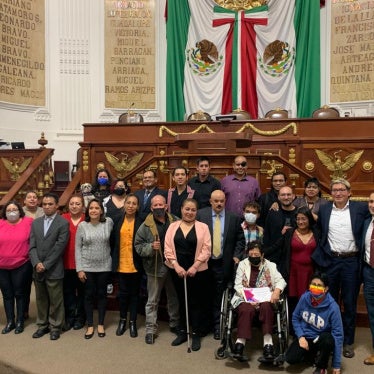The US disability rights activist Judith Heumann reflects in a recent book on the consequences of constantly having to ask for favors: “Doing favors for someone gets old. Favors mean that someone has to stop what they’re doing, whatever it is, in order to help you.” The possibility of having alternatives for independent living instead of constantly having to ask for favors is essential for people with disabilities.
In Mexico, millions of people with disabilities depend exclusively on support provided by their families as the only resource to conduct their daily activities. This puts them in a position of constantly having to ask for favors. But families get burned out and, in many instances, turn abusive against their family members with disabilities. Total dependency creates a setting for violence, particularly for women with disabilities, who face physical, sexual and emotional abuse. Too often this violence is hidden as many do not have the opportunity or means to report it.
Rosa (not her real name), a 38-year-old woman with a physical disability living in Monterrey, endured insults and regular emotional abuse and on one occasion physical violence from her former husband during her 15-year marriage. Her husband got upset because he had to do everything for her and he began to insult her, making her feel like a burden. “Can’t you do anything by yourself?” he would shout. Rosa was trapped. Without the possibility of moving out of her home and with no resources to get alternative personal assistance to move away from a violent partner, she had to put up with it.
In June, Human Rights Watch released a report documenting how the Mexican government has failed to implement even the most basic policies to enable people with disabilities to exercise their right to live independently and to be included in the community. In some cases, state governments actually legally require people with disabilities to rely on their families for support even when they would prefer to live independently or when family members are abusive.
Without such policies, people with disabilities lack control over their own lives, so in many cases relatives routinely invalidate or obstruct their ability to fulfill their aspirations. The lack of such policies also means that people with disabilities are at high risk of neglect and physical violence. In some cases, the response from their families takes egregious forms including confinement in animal barns and sexual violence.
The Mexican government’s response to the report’s findings has been positive: every official we have met, including Ariadna Montiel, Undersecretary of Welfare, has recognized Mexico’s huge problem with violence against people with disabilities. However, it’s unclear whether the federal government is ready to move from rhetoric to concrete action.
Soon after the release of the report, the head of the National Council to Prevent Discrimination (CONAPRED) was appointed to organize a working group to coordinate the government’s response to the report's recommendations. But on July 18, she was removed from her post and no one has been appointed as her successor. Meanwhile, since December 2018, President Andrés Manuel López Obrador has failed to appoint the head of the National Council for People with Disabilities (CONADIS), which is formally charged with coordinating government actions to ensure rights for people with disabilities. This means that right now nobody is coordinating federal policies to address the violence that afflicts many people with disabilities. This needs to change.
People with disabilities are entitled to decide where and with whom to live and not to accept predetermined living arrangements, like living with family members who are forced to provide support for the rest of their lives. HRW made specific recommendations to the secretaries of welfare at the federal and state levels to develop policies to ensure people with disabilities are able to decide how, where and with whom to live, and free from risks of being victims of family violence. There is an important opportunity to ensure general services to protect women against acts of violence are accessible for women with disabilities, including procedures to report abuses, protection orders and shelters.
The federal and state governments should urgently put together a working group to articulate comprehensive policies to prevent people with disabilities from continuing to become victims of violence and to enable people with disabilities to live independently and be included in the community. President López Obrador should also urgently name new heads of CONAPRED and CONADIS to ensure that there is someone charged with coordinating these policies. Only then will Rosa and other people with disabilities in Mexico be able to have control of their lives, without depending on the kindness of family members and begging for favors.









